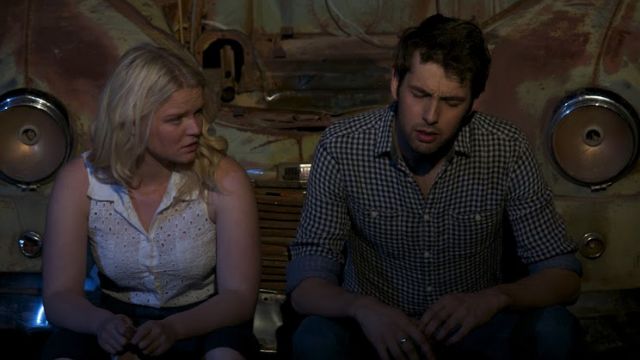How I Learned to Drive
Given the subject matter, this could have been gruelling. Luckily the script, a Lolita-style story of an abusive relationship told from the girl’s point of view, is a piece of quick witted brilliance that deserves the Pullitzer it won in 1998. NUTS have done a great job living up to the material. Director Emily Clarke is to be commended for coaxing well-tuned deliveries from the cast. The timing is spot on.
Lauren Atkin as Li’l Bit shone in the central role, having to convey a breadth of confused, conflicting emotions as she comes to terms with her memories as she reaches puberty and leaves home. At the beginning, it took a little bit of a mental shift to see young Dylan van den Berg as the middle-aged Uncle Peck, but he was strong enough in the role to overwrite his youthful appearance. He too was convincing as an outwardly chivalrous man who somehow believes that stalking and molesting a niece is acceptable behaviour. These two performances combined with the script combine to negate the effect of any weaknesses.
As for those weaknesses, there were a couple of design decisions that I felt could have been handled better. There were great elements, but it didn’t quite gel the way it could have. For instance, the audio-visual worked well when it was showing moving action over a monologue, but at on other occasions it distracted from the action in front. The interior shown on the left of the stage was realistic, whereas on the other side of the stage, the car of the title is a wrecked 1960s hulk – both of which looked great, and the car hulk could represent the rot at the core of the story. However, between these was an expanse of picket fence and a bunch of fake pot plants, which didn’t really feel like they belonged. My overall impression was a stage that didn’t quite relate from one side to the other. The other slight issue was that the accents could be a bit patchy – which admittedly is pretty much par for the course. Southern American accents are very important to the script, so they really couldn’t get away without them.
Whatever slight negatives existed were blasted out of the water by the script, and the delicate handling of the complex central relationship by the leads and the director, with solid backing from the three chorus characters.
Cathy Bannister
Subscribe to our E-Newsletter, buy our latest print edition or find a Performing Arts book at Book Nook.

